CONSUMING FIRE
Rabbi Simeon said: In one place it is written, "For the Lord thy God is a consuming fire" {Deut. 4:24}, and elsewhere, "But ye that cleave unto the Lord your God are alive every one of you this day" {Deut. 4:4}. The Companions have already discussed the seeming inconsistency between these texts, but I offer yet another interpretation.
It has been affirmed by the Companions that there exists a sort of fire which is stronger than other fire, and the one consumes and annihilates the other. If we continue this thought, it can be said that he who cares to pierce into the mystery of the holy unity of God should consider the flame as it rises from a burning coal or candle.
There must always be some material substance from which the flames thus rises. In the flame itself may be seen two lights: the one white and glowing, the other black, or blue. Of the two, the white light is the higher and rises unwavering. Underneath it is the blue or black light upon which the other rests as on a support. The two are conjoined, the white reposing upon the throne of the black. The blue or black base is, likewise, connected to something beneath it, which feeds it and makes it to cling to the white light above. At times this blue or black light turns red, but the light above remains constantly white. This lower light, at times black, at times blue, at times red, serves to link the white light above it with the material substance below to which it is bound and through which it keeps kindled. This lower light is in its nature an instrument for destruction and death, devouring whatever comes near it. But the white light above neither consumes nor demolishes, nor does it ever change.
Therefore Moses said, "For the Lord thy God is a consuming fire" {Deut. 4:24}, consuming, actually all that is beneath him; for this reason he said "thy God" and not "our God", inasmuch as Moses stood in the supernal light which does not consume and does not demolish.
Remark further. It is Israel alone which impels the blue light to kindle and to link itself with the white light, Israel, who cleave to the blue light from below. And though it be in the nature of the blue or black light to destroy whatever it touches beneath, yet Israel, cleaving to it from beneath, are not destroyed; so it is said, "But ye that cleave unto the Lord your God are alive every one of you this day." Your God and not our God; that is to say, it is the blue or black flame, consuming and annihilating whatever cleaves to it from below, and still you cleave and are alive.
Only just perceptible above the white light and encompassing it, is yet another light, this one symbolizing the supreme essence. So does the aspiring flame symbolize the supernal mysteries of wisdom.
Rabbi Phineas went to him and kissed him, and said, Blessed be God who guided me here. And they went out with Rabbi Phineas, accompanying him for three miles. When they had returned, Rabbi Simeon spoke: The description I have given may be taken as a symbol of the holy unity of God. In the holy name YHVH,* the second letter hé is the blue or balck light attached to the remaining letters yod, hé, vav, which constitute the luminous white light. But there come times when this blue light is not hé but dalet, which is to say, poverty; this means, when Israel fail to cleave to it from beneath and it in turn fails therefore to burn and cleave to the white light, the blue light is dalet, but when Israel make it to cleave to the white light, then it is hé. If male and female are not together, then hé is erased and there remains only dalet {poverty}. But when the chain is perfect, the hé cleaves to the white light, and Israel cleave to the hé and give substance for its light, and are yet not destroyed.
In this we see the mystery of the sacrifice. The rising smoke kindles the blue light, which then joins itself to the white light, whereupon the entire candle is wholly kindled, alight with a single unified flame. As it is the nature of the blue light to demolish whatever comes into touch with it from beneath, therefore if the sacrifice be acceptable and the candle wholly kindled, then, as with Elijah, "the fire of the Lord descends and consumes the burnt-offering" {I Kings 18:38}, and this reveals that the chain is perfected, for then the blue light cleaves to the white above, while at the same time consuming the fat and flesh of the burnt-offering beneath, nor can it consume what is below, except it rise and join itself to the white light. At such time, peace reigns in all worlds, and all together form a unity.
The blue light having devoured every thing beneath, the priests, the Levites, and the laity gather at its base with singing and meditation and with prayer, while above them the lamp glows, the lights are merged into a unity, worlds are illumined, and above and below, all are blessed. Therefore it is written, "ye, even while cleaving to the Lord your God, are alive every one of you this day." The word atem {you} is here preceded by the letter vav {and}, which indicates that while the fat and flesh cleaving to the flame are devoured by it, you who cleave to it are yet alive.
___________
* The four letters (Yod, Hé, Vav, Hé) of the name of God represent four stages of ever increasing divine manifestation.
It has been affirmed by the Companions that there exists a sort of fire which is stronger than other fire, and the one consumes and annihilates the other. If we continue this thought, it can be said that he who cares to pierce into the mystery of the holy unity of God should consider the flame as it rises from a burning coal or candle.
There must always be some material substance from which the flames thus rises. In the flame itself may be seen two lights: the one white and glowing, the other black, or blue. Of the two, the white light is the higher and rises unwavering. Underneath it is the blue or black light upon which the other rests as on a support. The two are conjoined, the white reposing upon the throne of the black. The blue or black base is, likewise, connected to something beneath it, which feeds it and makes it to cling to the white light above. At times this blue or black light turns red, but the light above remains constantly white. This lower light, at times black, at times blue, at times red, serves to link the white light above it with the material substance below to which it is bound and through which it keeps kindled. This lower light is in its nature an instrument for destruction and death, devouring whatever comes near it. But the white light above neither consumes nor demolishes, nor does it ever change.
Therefore Moses said, "For the Lord thy God is a consuming fire" {Deut. 4:24}, consuming, actually all that is beneath him; for this reason he said "thy God" and not "our God", inasmuch as Moses stood in the supernal light which does not consume and does not demolish.
Remark further. It is Israel alone which impels the blue light to kindle and to link itself with the white light, Israel, who cleave to the blue light from below. And though it be in the nature of the blue or black light to destroy whatever it touches beneath, yet Israel, cleaving to it from beneath, are not destroyed; so it is said, "But ye that cleave unto the Lord your God are alive every one of you this day." Your God and not our God; that is to say, it is the blue or black flame, consuming and annihilating whatever cleaves to it from below, and still you cleave and are alive.
Only just perceptible above the white light and encompassing it, is yet another light, this one symbolizing the supreme essence. So does the aspiring flame symbolize the supernal mysteries of wisdom.
Rabbi Phineas went to him and kissed him, and said, Blessed be God who guided me here. And they went out with Rabbi Phineas, accompanying him for three miles. When they had returned, Rabbi Simeon spoke: The description I have given may be taken as a symbol of the holy unity of God. In the holy name YHVH,* the second letter hé is the blue or balck light attached to the remaining letters yod, hé, vav, which constitute the luminous white light. But there come times when this blue light is not hé but dalet, which is to say, poverty; this means, when Israel fail to cleave to it from beneath and it in turn fails therefore to burn and cleave to the white light, the blue light is dalet, but when Israel make it to cleave to the white light, then it is hé. If male and female are not together, then hé is erased and there remains only dalet {poverty}. But when the chain is perfect, the hé cleaves to the white light, and Israel cleave to the hé and give substance for its light, and are yet not destroyed.
In this we see the mystery of the sacrifice. The rising smoke kindles the blue light, which then joins itself to the white light, whereupon the entire candle is wholly kindled, alight with a single unified flame. As it is the nature of the blue light to demolish whatever comes into touch with it from beneath, therefore if the sacrifice be acceptable and the candle wholly kindled, then, as with Elijah, "the fire of the Lord descends and consumes the burnt-offering" {I Kings 18:38}, and this reveals that the chain is perfected, for then the blue light cleaves to the white above, while at the same time consuming the fat and flesh of the burnt-offering beneath, nor can it consume what is below, except it rise and join itself to the white light. At such time, peace reigns in all worlds, and all together form a unity.
The blue light having devoured every thing beneath, the priests, the Levites, and the laity gather at its base with singing and meditation and with prayer, while above them the lamp glows, the lights are merged into a unity, worlds are illumined, and above and below, all are blessed. Therefore it is written, "ye, even while cleaving to the Lord your God, are alive every one of you this day." The word atem {you} is here preceded by the letter vav {and}, which indicates that while the fat and flesh cleaving to the flame are devoured by it, you who cleave to it are yet alive.
___________
* The four letters (Yod, Hé, Vav, Hé) of the name of God represent four stages of ever increasing divine manifestation.
[full original text follows... ☟ ]
Volume 1:50b
א
עִטְּרָא קַמָּךְ.
ב
אָמַר רַבִּי שִׁמְעוֹן כְּגַוְונָא דָא אוֹרַיְיתָא קָאִים בֵּין תְּרֵי בָּתִּים, כְּמָה דִכְתִיב, (ישעיהו ח׳:י״ד) לִשְׁנֵי בָּתֵּי יִשְׂרָאֵל וְגו'. חַד סְתִימָא עִלָּאָה. וְחַד אִתְגַּלְיָא יַתִּיר. (סתימא) עִלָּאָה (דא) קוֹל גָּדוֹל דִּכְתִיב, (דברים ה׳:י״ט) קוֹל גָדוֹל וְלא יָסָף. וְהַאי קוֹל פְּנִימָאָה אִיהוּ דְּלָא אִשְׁתְּמַע וְלָא אִתְגַּלְּיָא. וְדָא הוּא כַּד נְבִיעַ בֵּי גָרוֹן אַפִּיק (ביה) ה' בְּחֲשַׁאי וּנְבִיעַ תָּדִיר וְלָא פָּסַק. וְאִיהוּ דַּקָּה פְּנִימָאָה דְּלָא אִשְׁתְּמַע לְעָלְמִין.
ג
וּמֵהָכָא נָפְקָא אוֹרַיְיתָא דְּאִיהוּ קוֹל יַעֲקֹב. וְהַאי אִשְׁתְּמַע (ד''א דאשתמע) דְּנָפְקָא (ד''א נפקא) מֵהַהִיא דְּלָא אִשְׁתְּמַע. וּלְבָתַר אִתְאַחִיד דִּבּוּר בַּהֲדֵיהּ וְנָפַק לְבַר מֵחֵילֵיהּ וּמִתָּקְפֵּיהּ. וְקוֹל דְּיַעֲקֹב דְּאִיהוּ אוֹרַיְיתָא אָחִיד בֵּין תְּרֵי נִקְבֵי. אָחִיד בְּהַאי פְּנִימָאָה דְּלָא אִשְׁתְּמַע. וְאָחִיד בְּהַאי דִלְבַר דְּאִשְׁתְּמַע.
ד
תְּרֵין אִנּוּן דְּלָא אִשְׁתָּמְעוּ וּתְרֵין אִנּוּן דְּאִשְׁתָּמְעוּ. תְּרֵין דְּלָא אִשְׁתָּמְעוּ, דָּא הוּא חָכְמָה עִלָּאָה סְתִימָאָה דְּקָיְימָא בְּמַחֲשָׁבָה דְּלָא אִתְגַּלְיָא וְלָא אִשְׁתְּמַע. לְבָתַר נָפְקָא וְאִתְגַּלְּיָא זְעֵיר בַּחֲשַׁאי דְּלָא אִשְׁתְּמַע הַהוּא דְּאִקְרֵי קוֹל גָּדוֹל דְּהוּא דַּק וְנָפִיק בַּחֲשַׁאי.
ה
תְּרֵין אִנּוּן דְּאִשְׁתָּמְעוּ, אִנּוּן דְּנָפְקֵי מֵהָכָא קוֹל דְּיַעֲקֹב וְדִבּוּר דְּאִתְאֲחִיד בַּהֲדֵיהּ. הַאי קוֹל גָּדוֹל דְּאִיהוּ בַּחֲשַׁאי וְלָא אִשְׁתְּמַע. אִיהִי בַּיִ''ת לַחָכְמָה עִלָּאָה. וְכָל נוּקְבָא בַּיִ''ת אִקְרֵי. וְהַאי דִּבּוּר בַּתְרָאָה אִיהוּ בַּיִת לַקּוֹל דְּיַעֲקֹב דְּאִיהוּ אוֹרַיְיתָא. וְעַל דָּא אוֹרַיְיתָא שַׁרְיָא בְּבֵי''ת. בֵּי''ת רֵאשִׁית.
ו
פַּתַח וְאָמַר בְּרֵאשִׁית בָּרָא אֱלֹהִים, הַיְינוּ דִכְתִיב וַיִּבֶן יְיָ אֱלֹהִים אֶת הַצֵּלָע. אֶת הַשָּׁמַיִם הַיְינוּ דִכְתִיב וַיְבִיאֶהָ אֶל הָאָדָם. וְאֶת הָאָרֶץ כְּמָא דְאַתְּ אָמֵר וְעֶצֶם מֵעֲצָמַי. וַדַּאי הַאי אִיהִי אֶרֶץ הַחַיִּים.
ז
תּוּ פָּתַח רַבִּי שִׁמְעוֹן וְאָמַר (תהלים ק) נְאֻם יְיָ לַאדוֹנִי שֵׁב לִימִינִי עַד אָשִׁית אוֹיְבֶיךָ הֲדוֹם לְרַגְלֶיךָ. נְאֻם יְיָ לַאדוֹנִי, דַּרְגָּא עִלָּאָה לְדַרְגָּא תַּתָּאָה קָאָמַר שֵׁב לִימִינִי, לְאִתְקַשְּׁרָא מַעֲרָבִית בִּדְרוֹמִית שְׂמָאלָא בְּיָמִינָא. בְּגִין לְתַבְּרָא חֵילֵיהוֹן דִּשְׁאָר עַמִין עוֹבְדֵי כּוֹכָבִים וּמַזָּלוֹת. נְאֻם יְיָ לַאדוֹנִי, נְאֻם יְיָ דָּא יַעֲקֹב. לַאֲדוֹנִי דָּא (יהושע ג׳:י״א) אֲרוֹן הַבְּרִית אֲדוֹן כָּל הָאָרֶץ. דָּבָר אַחֵר נְאֻם יְיָ דָּא יוֹבְלָא. לַאֲדוֹנִי דָּא שְׁמִיטָה. דִּכְתִיב בָּהּ (שמות כ״א:ה׳) אָהַבְתִּי אֶת אֲדוֹנִי. שֵׁב לִימִינִי דְּהָא יְמִינָא בְּיוֹבְלָא שָׁרְיָא. וּשְׁמִיטָה בָּעֵי לְאִתְקַשְּׁרָא בְּיָמִינָא.
ח
תָּא חֲזֵי, שְׁמִיטָה דָא לָא אִתְקְשַׁר בְּקִיּוּמָא שְׁלִים בְּיָמִינָא ובִשְׂמָאלָא מִיּוֹמָא דְּאִשְׁתַּכְּחַת, כַּד בָּעְיָא לְאִתְקַשְּׁרָא אוֹשִׁיט דְּרוֹעָא שְׂמָאלָא לְקֳבְלָהּ וּבָרָא עָלְמָא דֵין. וּבְגִין דְּהוּא מִסִּטְרָא דִּשְׂמָאלָא לֵית בֵּיהּ קִיּוּמָא עַד זִמְנָא דְּאֶלֶף שְׁבִיעָאָה. דִּבְהַהוּא יוֹמָא לְחוּד אִתְקַשַּׁר כְּדֵין בְּיָמִינָא. וּכְדֵין תֶּהוֵי בֵּין יָמִינָא וּשְׂמָאלָא בְּקִיּוּמָא שְׁלִים וְיִשְׁתַּכְּחוּן שָׁמַיִם חֲדָשִׁים וְאֶרֶץ חֲדָשָׁה וּכְדֵין לָא תַעֲדֵי מִתַּמָּן לְעָלְמִין.
ט
אִי הָכִי בְּמַאי נוֹקִים שֵׁב לִימִינִי. אֶלָּא עַד זִמְנָא יְדִיעָא דִּכְתִיב עַד אָשִׁית אוֹיְבֶיךָ הֲדוֹם לְרַגְלֶיךָ וְלָא תָדִיר. אֲבָל בְּהַהוּא זִמְנָא לָא תַעֲדֵי מִתַּמָּן לְעָלְמִין דִּכְתִיב, (ישעיהו נ״ד:ג׳) כִּי יָמִין וּשְׂמֹאל תִּפְרוֹצִי לְמֶהוֵי כֹּלָּא חַד.
י
תָּא חֲזֵי, אֶת הַשָּׁמַיִם דָּא שְׁכִינְתָּא עִלָּאָה. וְאֶת הָאָרֶץ דָּא שְׁכִינְתָּא דִּלְתַתָּא בְּאִתְחַבְּרוּתָא דִּדְכַר וְנוּקְבָא כְּחֲדָא. וְהָא אִתְּמָר כְּמָה דְּאִתְעָרוּ בֵּיהּ חַבְרַיָיא עַד כְּעָן.
יא
בָּעוּ (ד''א בעא) לְמֵיזַל. קָמוּ. אָמַר רַבִּי שִׁמְעוֹן מִלָּה הָכָא גַּבָּן. פָּתַח רַבִּי שִׁמְעוֹן וְאָמַר, תְּרֵי קְרָאֵי כְּתִיבֵי, (דברים ד׳:כ״ד) כִּי יְיָ אֱלֹהֶיךָ אֵשׁ אוֹכְלָה הוּא. וּכְתִיב הָתָם (דברים ד׳:ד׳) וְאַתֶּם הַדְּבֵקִים בַּיְיָ אֱלֹהֵיכֶם חַיִּים כֻּלְּכֶם הַיּוֹם. הָנֵי קְרָאֵי אוֹקִימְנָא לְהוּ בְּכַמָּה אֲתַר וְאִתְעָרוּ בְּהוּ חַבְרַיָיא. תָּא חֲזֵי, כִּי יְיָ אֱלהֶיךָ אֵשׁ אוֹכְלָה הוּא, הָא אִתְּמָר מִלָּה דָא בְּגוֹ חַבְרַיָיא דְּאִית אֶשָׁא אָכְלָא אֶשָׁא (ואיתאשא) וְאָכִיל לָהּ וְשָׁצֵי לָהּ. בְּגִין דְּאִית אֶשָׁא תַּקִּיפָא מֵאֶשָׁא וְאוּקְמוּהָ.
יב
אֲבָל תָּא חֲזֵי, מָאן דְּבָעֵי לְמִנְדַע חָכְמְתָא דְּיִחוּדָא קַדִּישָׁא. יִסְתַּכַּל בְּשַׁלְהוֹבָא דְּסָלְקָא מִגּוֹ גַּחֶלְתָּא. אוֹ מִגּוֹ בּוֹצִינָא דְּדָלִיק. דְּהָא שַׁלְהוֹבָא לָא סָלְקָא אֶלָּא
Labels: Consuming Fire, Divine Presence, English translations, Gershom Scholem, God, Jewish mysticism, Judaism, Kabbalah, Sefirot, Shekhinah, Torah, Tree of Life, Zohar
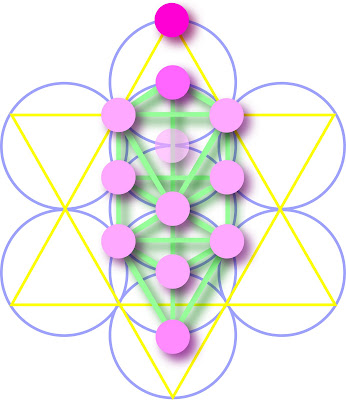

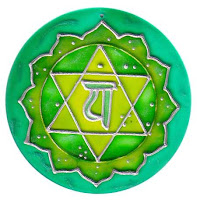

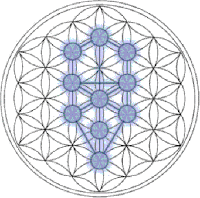

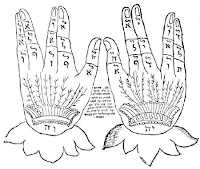

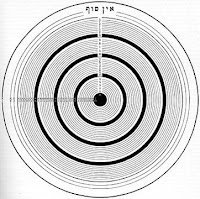
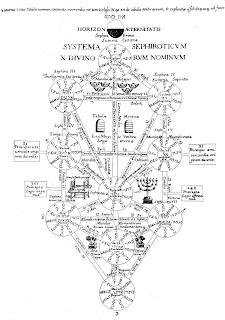
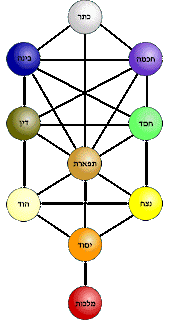
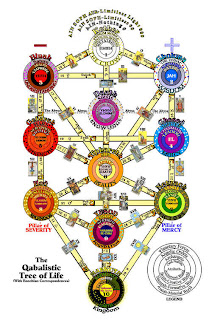

0 Comments:
Post a Comment
Subscribe to Post Comments [Atom]
<< Home